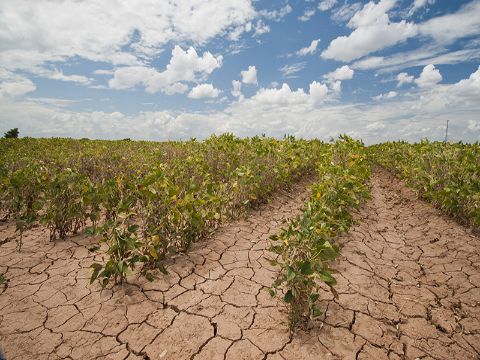The director general of the International Center for Agricultural Research in the Dry Areas (ICARDA) and CGIAR’s regional director for Central and West Asia and North Africa, Aly Abousabaa, writes that the Middle East’s expertise in handling heat could be of benefit worldwide.
The Middle East and North Africa (MENA) region is the driest in the world and home to four of the five most water-stressed countries on the planet. But its legacy as the cradle of agriculture also makes it an increasingly valuable source of global wisdom and innovation for adapting food systems for hotter, drier climates – a challenge that lies ahead for a growing number of countries.
Thanks to its “fertile crescent”, a richly biodiverse area in the Middle East, the region has witnessed more than 10,000 years of agricultural transformation and continues to be at the forefront of dryland farming.
With rising temperatures and desertification spreading around the globe, this year’s COP28 climate talks in Dubai offer a timely opportunity to learn from the region’s vast experience and the scientific solutions that are enabling desert farming against the odds.
What MENA lacks in freshwater, it makes up for in resilient, ancient plant and animal species and millennia of agricultural ingenuity.
The region’s extraordinary agricultural heritage and harsh conditions mean it remains a treasure trove of “crop wild relatives” – original food plant species that have evolved over thousands of years to survive heat, water stress and poor soil.
For scientists looking for plant genetic traits that can withstand the kinds of climate extremes now occurring in countries such as Australia, Canada, Spain and the US, MENA is a hotbed of source material from which to develop hardier, more climate tolerant crops.
For example, CGIAR recently released six new drought tolerant varieties of barley and durum wheat using samples stored at a crop genebank managed by the International Center for Agricultural Research in the Dry Areas (ICARDA) in Morocco.
CGIAR’s climate-smart crops offer a vital buffer against the impact of drought, which last year reduced wheat production by around 70 per cent in Morocco, where conditions were so harsh the episode was named “the drought of the century”.
ICARDA has released about 880 new crop varieties in the last 40 years, generating annual benefits worth over US$850 million – and this goes well beyond the MENA region. In the last five years, more than 120 climate-resilient cereal and legume crops have been grown in more than 20 countries.
CGIAR’s heat-resilient wheat varieties, derived from the MENA region’s crop wild relatives, increased yields by up to 24 per cent when tested on sites in Ethiopia, Lebanon, Morocco and Senegal.
Alongside breeding hardier crops, agricultural researchers in the region have also developed cutting-edge early warning systems to help MENA countries and other water-stressed nations to better forecast and anticipate droughts.
Scientists working on the MENAdrought project in collaboration with governments in Jordan, Lebanon and Morocco, have built country-specific systems which predict the likelihood of drought conditions over the next one to three months. This allows farmers and local authorities to manage water resources more effectively and make better-informed planting decisions.
A drought index has already been adopted to show where stressed conditions exist and trigger actions to help, and the project has expanded to Tunisia, with interest from other MENA countries.
The region also offers a compelling example of how traditional knowledge and practices can be harnessed to bolster food security, accelerated through local and regional collaboration.
For instance, the Integrated Desert Farming Innovation Program has been launched as part of the US-UAE initiative, Agriculture Innovation Mission (AIM) for Climate, to harness and expand desert farming practices across the Arabian Peninsula and beyond.
Techniques that have improved productivity and reversed desertification include water management innovation, green energy integration, vertical farming, conservation agriculture and deep learning through satellite observation.
A novel technique is the use of an ancient practice known as “Marab”, which involves creating areas of relatively flat land that slows water flow after rainfall, allowing more moisture retention and less degradation.
Reseeding indigenous range species, including grasses and legumes with reduced water needs, and controlling the grazing of livestock have also been shown to contribute to rangeland rehabilitation. Using this technology in Jordan meant barley production increased from 0.34 to 8.37 tonnes per hectare and the yields became more reliable due to a lesser dependence on unpredictable rainfall.
While the world races to limit global temperature rises, climate change is already under way with now inevitable consequences both in MENA and beyond.
As many more countries face hotter and drier conditions, the MENA region is a valuable test case for the adaptive capacity of agriculture. Many of the innovations developed in the Middle East and North Africa will become instrumental to farming in a climate emergency.
Governments, policymakers and climate negotiators at COP28 must heed the lessons of the MENA region to enshrine food security in a hotter, drier world.
ICARDA researches and develops climate-smart agri-innovations to generate resilient livelihoods for dryland farmers suffering a climate crisis.
This piece was produced by SciDev.Net’s Global desk.


